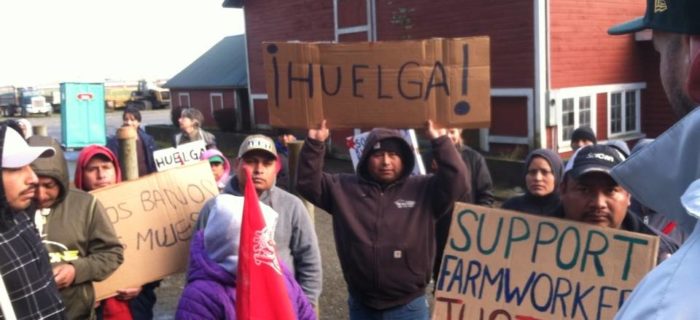Immigration and the Food System
Click here to download this Backgrounder in full, or view in full below.
Immigration policy in imperialist nations has historically produced “waves of labor” of vulnerable workers who are systematically exploited by industrial enterprises in the respective host nation. Academics and journalists alike have documented how these workers have become an integral part of a capitalist food system; many times, their well-intentioned interventions have come to be used to justify the legal perpetuation of this condition through immigration, labor and public health policy.
In the context of 20th century neoliberal globalization, multinational corporations had accumulated the capital necessary to move production around the globe at will. This is not a new phenomenon, as settler colonial nations have perpetually established colonies for similar purposes throughout history across vast territories. The new frontier has been multinational corporations setting up shop in the countries that they helped to destabilize.
Click here to download this Backgrounder in full, or view in full below.
Backgrounder_WINTER_2018_Last
Endnotes:
1. Eric Holt-Giménez. A Foodie’s Guide to Capitalism: Understanding the Political Economy of What We Eat (New York, NY: Monthly Review Press, 2017).
2. Angela Mitropoulos. “Autonomy, Recognition, Movement,” the commoner, no. 11 (2006), http://www.commoner.org.uk/11mitropoulos.pdf (accessed November 16, 2018).
3. See Patel 2013; Kaur et al. 2011; International Food Policy Research Institute 2002; Sonnefield 1992.
4. See Devon G. Peña et al., Mexican-Origin Foods, Foodways, and Social Movements: A Decolonial Reader (Fayetteville, AR: University of Arkansas Press, 2017).
5. Devon G. Peña. “Putting knowledge in its place: epistemologies of place-making in a time of globalization” (plenary address at the Place Matters Conference, Seattle, Washington, October 2006).
6. Ethan Miller. “Solidarity Economy: Key Concepts and Issues,” in Solidarity Economy I: Building Alternatives for People and Planet, ed. Emily Kawano, Thomas Neal Masterson and Jonathan Teller-Elsberg (Amherst, MA: Center for Popular Economics, 2010), 25-41, p. 29.
7. Karl Marx. Pre-Capitalist Economic Formations. Trans. Jack Cohen (New York, NY: International Publishers, 2007) [1965], pg. 67.
8. David Bacon, Illegal People: how globalization creates migration and criminalizes immigrants (Boston, MA: Beacon Press, 2008), Justin Akers Chacon & Mike Davis, No One is Illegal: Fighting Violence and State Repression on the U.S.-Mexico Border (Chicago, IL: Haymarket Books, 2006); T. Madrigal. “Agribusiness and Mexican Farmworker Families in Washington State 1964-2013” (Ph.D. diss., University of California Santa Barbara, 2016), 223-232; Tomas Madrigal, “The Political Recomposition of a Global Agricultural Working Class” (paper presented at the Pacific Sociological Association, Long Beach, California, March 28, 2018).
9. Tomas Madrigal, “The role of the Private Security Industrial Complex in 21st century agricultural strike breaking, immigration detention, and mass murder,” Karani: Escribir o Volar Blog, June 18, 2016, https://karani.wordpress.com/2016/06/18/the-role-of-the-private-security-industrial-complex-in-21st-century-agricultural-strike-breaking-immigration-detention-and-mass-murde/ (accessed September 16, 2018).
10. Claude Meillassoux. Maidens, meal, and money: capitalism and the domestic community. (Cambridge, England: Cambridge University Press, 1975).
11. Ibid.
12. Ibid.
13. Michelle Alexander. The New Jim Crow: Mass Incarceration in the Age of Colorblindness (New York, NY: The New Press, 2010).
14. Ibid, 2.
15. Marc Maur. Race to Incarcerate (New York, NY: The New Press, 2006).
16. Tomas Madrigal, “The role of the Private Security Industrial Complex in 21st century agricultural strike breaking, immigration detention, and mass murder,” Karani: Escribir o Volar Blog, June 18, 2016, https://karani.wordpress.com/2016/06/18/the-role-of-the-private-security-industrial-complex-in-21st-century-agricultural-strike-breaking-immigration-detention-and-mass-murde/ (accessed September 16, 2018).
17. See Devra Weber. “Keeping Community, Challenging Boundaries: Indigenous Migrants, Internationalist Workers and Mexican Revolutionaries, 1900-1920,” in ed. John Tutino, Mexico and Mexicans in the History and Culture of the United States, (Austin: University of Texas Press, 2012), 208-235 and Oscar Rosales Castañeda. “Chicano Movement in Washington: Political Activism in the Puget Sound and Yakima Valley Regions, 1960s-1980s,” in HistoryLink.org, Essay 7922, http://www.historylink.org/File/7922 (accessed November 16, 2018).
18. David Bacon. The Right to Stay Home: How US Policy Drives Mexican Migration. (Boston: Beacon Press, 2013).
About the Author: Tomás was born to a Mexican migrant farm worker family who settled in the lower Yakima Valley of Washington State in the early 1970s. He is the child of Mexican immigrants, his mother a childhood arrival in 1963 and his father a young immigrant arriving in 1969. His family lines are Mexican indigenous diaspora, Purepecha from his mother’s side and Tecuexe from his father’s side. Tomás’ immediate family continues to work for an industrial tree fruit producing, multi-billion dollar enterprise. It continues to be the largest contiguous orchard and largest grossing enterprise in Washington state. Having worked on this farm as a child, Tomás wrote his dissertation documenting the way that non-unionized farm workers advocated for their wellbeing at this farm, and he was also able to document the birth and development of the first democratic and independent Mexican Farmworker Union, Familias Unidas por la Justicia in North Western Washington state who won their first union contract in 2016. He has worked as a farm worker advocate for over a decade and draws from his lived experience to blend impacted community-driven and data-driven solutions to the overall wellbeing of the community.
Stay in the loop with Food First!
Get our independent analysis, research, and other publications you care about to your inbox for free!
Sign up today!

 Help Food First to continue growing an informed, transformative, and flourishing food movement.
Help Food First to continue growing an informed, transformative, and flourishing food movement.




